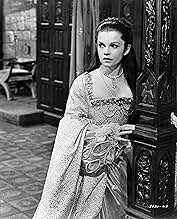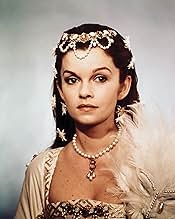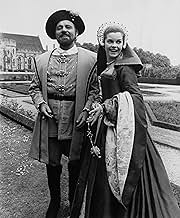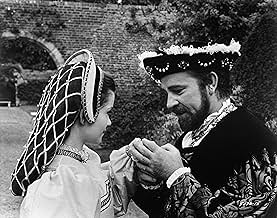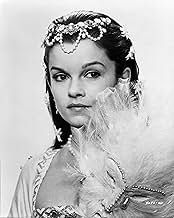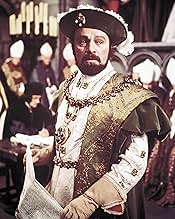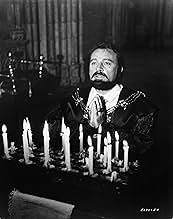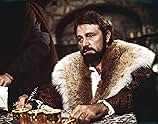Ajouter une intrigue dans votre langueKing Henry VIII of England discards one wife, Catharine of Aragon, who has failed to produce a male heir, in favor of the young and beautiful Anne Boleyn.King Henry VIII of England discards one wife, Catharine of Aragon, who has failed to produce a male heir, in favor of the young and beautiful Anne Boleyn.King Henry VIII of England discards one wife, Catharine of Aragon, who has failed to produce a male heir, in favor of the young and beautiful Anne Boleyn.
- Réalisation
- Scénario
- Casting principal
- Récompensé par 1 Oscar
- 6 victoires et 16 nominations au total
- Anne Boleyn
- (as Genevieve Bujold)
Avis à la une
Anne Boleyn, here played by Genevieve Bujold, was caught up in these events and ultimately became a casualty of circumstances. I'm not a history buff so can't fill in the true story but it's obvious there was much political intrigue taking place. Also, it rather reminded me of "Othello" in which the ill-fated Desdemona was victimized by Iago's slander. Genevieve portrays Anne with deep conviction and her tremendous vehemence at times sweeps us along through happy moments as well as fiery clashes with family, king, and authorities.
I was enthralled by the excellent supporting actors who formed the king's entourage, and hope to know them by name one day. In particular was their exchange of witty dialogue in the captivating scene which ended in a reference to a "venison haunch." I believe one of these actors later appeared in "Mary, Queen of Scots" (1971) as I recognized the same wonderful voice, and I think it's Vernon Dobtcheff. Well, it's a bit of detective work I must do to confirm.
Anthony Quayle's portrayal of Cardinal Wolsey was right on. Oh the glories of power in high places, so many titled positions he held! Yet in the end the Cardinal could hold onto none of them in a true sense. I feel this is one role where Quayle really excelled as an actor and a very dramatic presence.
For me this film goes hand in hand with "A Man for All Seasons" and "Mary, Queen of Scots" for some great drama on screen.
That's why his reign is just a darling for Hollywood. It has everything: obsession, love, lust, passion, hubris, politics, conspiracy, trials and many heads ending on the ballot. It's below-the-waist matters leading to the most pivotal episode of British history and producing one of its greatest monarchs Queen Elizabeth or as Pauline Kael put it "Anne's posthumous triumph". So, who needs books to learn about British monarchy history when you have Best Picture nominees (and occasional winners)? After having been inspired by Thomas More's integrity in "A Man of All Seasons", mesmerized by the rising charisma of "Elizabeth", now I feel like I almost completed my knowledge about Henry VIII's tumultuous reign with Charles Jarrott's "Anne of the Thousand Days", adapted from Maxwell Anderson's play. And I'm so proud to recognize some names like Norfolk or Cardinal Wosley (remarkably played by Anthony Quayle) And as Anne, Genevieve Bujold, is the perfect match for a Burtonesque character, a woman who can control the man who wants to control everything.
Anne is a young experienced girl, deprived of that virginity upon which the legend of her daughter would be built. She's lively and has a personality that throws sparkles all over the court. We first see her being lifted by her fiancé Lord Percy (Terence Wilton), she's in the air short enough so one head turns to her direction and notices her, it's the king. From that moment, he'll only have eyes for her. These three seconds are simply perfect and give that edge to cinema over the play where eye-language can't be perceptible. That look is the first brick to pave the road of a cultural revolution in Britain but it's handled in a rather trivial way. The Queen Catherine of Aragon, played in all matrimonial dignity by Irene Papas who specialized in roles of martyred wives, leaves the royal ball, the music stops but the King insists the show must go on. That scene find a powerful echo later in the film when Anne is the Queen and Henry starts having eyes on Jane Seymour, showing that the reign of Henry VII was all but a series of new beginnings.
The whole challenge of "Anne of the Thousand Days" is to make this transition from one Queen to another a riveting experience on both a human and political level, with Bujold's performance as a queen who wouldn't sell herself cheaply to a man who absolutely adores her is full of surprisingly unpredictable scenes. That Burton makes his King a little more accessible allows her to play 'hard to get', she has reasons to loathe him as she was prevented to marry her true love but on the other hand, she was advised not to give herself too easily for Henry would immediately renounce her. It is a slight possibility that she truly loved him and thus feigned indifference. And it is possible that Henry followed his courts' advisers to show his tender side. The film is a like a romantic game of hide-and-seek that hides graver diplomatic matters (with Spain and the Vatican) and one woman's personal ambition.
Anne wants to be the Queen and she promises sons if he can make her so and if he can't divorce Catherine, he'll use his power to cancel his wedding. It all can be summed up in Thomas More's warning to Norfolk "tell him what he ought to do, not what he's able to do". It's the most dangerous thing to tell a man such as Henry for what he can do because he'd realize sooner that he can do anything The catch is that Anne must fulfill her promise and if a king can make himself marry anyone, he can't control which chromosome he gives. The film is then a series of political machinery that all end up breaking on the wall of destiny: Henry can't have a male child, not one that can live after birth anyway. And divorce is like murder, one you do it once, the second time is no other and so.
The little weakness of the film is that we get from a passionate sequence between the two to Henry's immediate rejection of Anne after the second "failed birth" and so her demise seems rather abrupt, not as smooth as Thomas More's slow descent in disgrace in "A Man for All Seasons", but then-again Burton's performance redeems these flaws as he never really displays true hatred, he's just a man who wants to convince himself that he's doing the right thing. And Anne is not a heroine either, she has the blood of purer souls in her hands but it was worth having the future of England in her womb. The film is the collisions of two dangerous convictions: "I will have a son", "I will bear the future monarch of England", guess who was right?
Le saviez-vous
- AnecdotesDame Elizabeth Taylor was present at the shooting of the final Tower of London scene, out of fear that her husband, Richard Burton, and his co-star, Geneviève Bujold, were having an affair. Before she began filming the scene, a furious Bujold told director Charles Jarrott, "I'm going to give that bitch an acting lesson she'll never forget!"
- GaffesMary Tudor and her mother Catherine of Aragon are talking after Anne has become Queen. When Anne was Queen, Mary and her mother were forbidden to see each other.
- Citations
King Henry VIII: You whore!
Anne: But Elizabeth was yours. Watch her as she grows; she's yours. She's a Tudor! Get yourself a son off of that sweet, pale girl if you can - and hope that it will live! But Elizabeth shall reign *after* you. Yes! Elizabeth - child of Anne the Whore and Henry the Blood-Stained Lecher - shall be Queen!
King Henry VIII: You've asked for death and you shall have it.
Anne: So be it. Only what I take to my grave, you take to yours. And think of this, Henry: Elizabeth shall be a greater Queen than any King of yours. She shall rule a greater England than you could ever have built! Yes - *my* Elizabeth shall be Queen. And my blood will have been well spent!
- ConnexionsFeatured in The World According to Smith & Jones: The Tudors (1987)
- Bandes originalesGalliard
(uncredited)
Music by Anthony Holborne
Meilleurs choix
- How long is Anne of the Thousand Days?Alimenté par Alexa
Détails
Box-office
- Montant brut aux États-Unis et au Canada
- 2 068 232 $US
- Durée2 heures 25 minutes
- Couleur
- Rapport de forme
- 2.35 : 1
Contribuer à cette page




